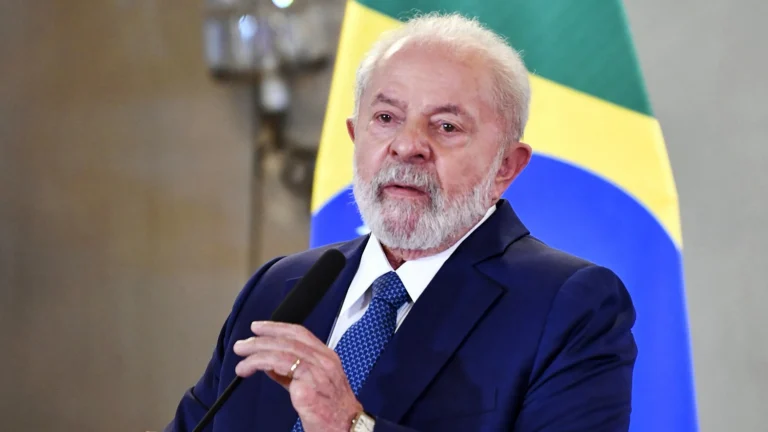Brazilian President Luiz Inácio Lula da Silva has canceled his planned trip to Russia for the Brics summit following a fall at his home that resulted in a minor brain hemorrhage. The incident occurred on Saturday, and the president’s health has since become a focal point of concern.
In an official statement released by the presidential office, it was confirmed that Lula, who is 78 years old, will participate in the summit via videoconference instead of attending in person. This decision was made after receiving medical advice to temporarily avoid long-haul flights due to his condition. He was initially set to depart at 5 PM on Sunday.
Lula’s fall caused significant trauma to the back of his head, necessitating stitches and leading to what has been described as a “small brain hemorrhage” in the temporal-frontal region. His doctor, Roberto Kalil, provided updates on the situation during an interview with GloboNews, reassuring the public about the president’s overall well-being.
Kalil emphasized that while Lula is recovering, he will need to undergo repeated tests throughout the week. He highlighted the importance of close observation, as any brain hemorrhage carries the potential risk of worsening in the days following the initial injury.
According to a medical report issued by the Sirio Libanes hospital in Brasília, the president sustained a laceration to the occipital region of his head. While the report advised against long-distance air travel, it stated that Lula is otherwise capable of performing his regular duties.
In light of Lula’s situation, the government announced that Foreign Minister Mauro Vieira would lead the Brazilian delegation at the Brics summit, departing on the same day Lula was originally scheduled to leave. This shift in leadership underscores the administration’s commitment to maintaining Brazil’s presence at the summit despite the president’s health concerns.
Gleisi Hoffmann, a prominent congresswoman and president of Lula’s Workers Party, also addressed the situation. She reported that she had spoken with the president and confirmed that he was feeling well, with the only precaution being his avoidance of a long trip.
The cancellation of Lula’s trip to Russia is particularly noteworthy given the significance of the Brics summit, where leaders from Brazil, Russia, India, China, and South Africa gather to discuss economic cooperation and geopolitical issues. Lula’s absence could impact Brazil’s engagement in these discussions.
However, the decision to participate via videoconference allows Lula to remain involved without jeopardizing his health. This alternative approach reflects a broader trend among world leaders who have adapted to virtual formats in response to health concerns or travel restrictions.
The Brazilian president’s focus on his health comes at a critical time as he seeks to navigate complex domestic and international challenges. Lula’s administration has been under pressure to address issues such as deforestation in the Amazon and social inequalities in Brazil.
As Lula prioritizes his recovery, the Brazilian government continues to push forward with its agenda. The appointment of Mauro Vieira to lead the delegation signifies confidence in Brazil’s diplomatic efforts, ensuring that the country’s voice will still be heard at the summit.
Lula’s commitment to addressing climate change and protecting the Amazon rainforest remains a central aspect of his presidency. His leadership in these areas has garnered attention on the global stage, and his absence at the summit may raise questions about Brazil’s role in these discussions.
Despite the challenges posed by his health, Lula’s administration is determined to uphold its environmental commitments. The Brics summit presents an opportunity to discuss collaborative efforts among member countries to tackle climate change and promote sustainable development.
As the situation develops, Lula’s health will be closely monitored, with updates from his medical team expected throughout the week. His ability to engage in normal activities, as noted by Dr. Kalil, suggests that he may be able to continue his work from home during his recovery.
The Brazilian president’s fall serves as a reminder of the vulnerabilities that come with leadership, particularly at an advanced age. Lula’s resilience and experience will be crucial as he navigates this health setback while remaining engaged in national and international affairs.
In the coming days, all eyes will be on Lula as he balances his recovery with the responsibilities of his office. His participation via videoconference will allow him to stay connected with his government and international partners while prioritizing his health.
As the Brics summit unfolds, Lula’s absence may prompt discussions about the importance of health and well-being among world leaders, especially in the context of ongoing global challenges. The focus will be on how countries can support their leaders while ensuring the continuity of governance.
Overall, Lula’s situation highlights the interplay between personal health and political leadership, particularly in a time of significant global challenges. His commitment to remaining engaged, even from a distance, underscores the importance of maintaining diplomatic relationships and addressing pressing issues.
In the wake of his fall, Lula’s leadership will continue to be tested, but his administration appears poised to adapt and persevere. The future will reveal how his health impacts his initiatives and Brazil’s position on the world stage.
Source

